Description
Human skin is one of the most sensitive parts of the body, many people with skin conditions also lose their self-confidence. Since the mission of Kish Medipharm Pharmaceutical Group is to contribute to the health of the community, it has focused its efforts on producing pharmaceutical products, including skin care. One type of skin treatment product is called Medipharm Erythromycin Topical Gel.
Erythromycin is a powerful macrolide antibiotic that stops the growth of bacteria. This raw material is produced in various forms of erythromycin ointment, gel, solution, capsule, and tablet for bacterial treatments around the world.
One of the products produced by Kish Medipharm Pharmaceutical Company is Medipharm Erythromycin Topical Gel. This product is formulated with 2 and 4 percent doses and is used externally. Erythromycin Topical Gel is often used to treat all types of acne and pimples. Azithromycin tablets are also recommended for acne and its treatment. Below, we have reviewed all the important points about this skin care product. To know what Medipharm Erythromycin Topical Gel is, stay with us for the rest of this article.
Indications for use of Medipharm Erythromycin Topical Gel
You may have heard of this topical antibiotic as a powerful anti-acne treatment, but it's good to know that Medipharm Erythromycin Topical Gel is not just for eliminating acne and pimples. This treatment product improves all types of acne. Other uses of Medipharm Erythromycin Topical Gel include:
- Papular acne
- Acne vulgaris
- Nodular acne
- Pustular acne
- Seborrheic dermatitis
- Treatment of skin lesions
- Inflamed and red pimples
- Types of severe and cystic acne
- Improves and reduces skin redness and inflammation
- Treating acne during pregnancy and breastfeeding
- Soothes some skin infections
- Comedones and open acne have developed
- Improves problems such as impetigo, folliculitis, and erythema rosacea
Medipharm Erythromycin topical gel is prescribed to reduce mild to moderate skin problems. In cases where the severity of the condition is more severe, it may be used in conjunction with oral antibiotics at the discretion of the specialist physician to speed up the results.
Contraindications for the use of Erythromycin Medipharm
All medicines are produced to improve the health of the community, but for some reason they may not be suitable for all people. Therefore, all conditions should be fully explained to the treating doctor. One of the most important contraindications to the use of erythromycin is allergy to the raw material of this product. Other contraindications to the use of this medicine include the following:
- Having open wounds
- Children, pregnant and lactating women
- People with myasthenia gravis
- Severe skin inflammation or acute allergic reactions
- Have underlying diseases, including liver and kidney problems
Side effects of Erythromycin Medipharm
Erythromycin topical gel has a lower systemic absorption due to its concentration, which reduces the side effects of using this product. However, this therapeutic product can also have side effects. One of the most important causes of unwanted problems is drug interactions. The most common side effects of erythromycin include:
- Dryness, burning, itching, redness, and inflammation on the surface of the skin
- Shortness of breath and difficulty breathing
- Liver and kidney problems
- Myasthenia gravis
- Occurrence of angiitis
If any of the listed side effects of erythromycin topical gel occur acutely or for a long time, be sure to consult a specialist or emergency room immediately. This medicinal product is recommended for short-term use and should only be used for longer periods as directed by a doctor.
Drug interactions of erythromycin topical gel
One of the most important sections of any medication leaflet is the drug interactions section. Although you can always ask questions and consult with your pharmacist, try to always keep the medicinal products with the leaflet. Many important points are written on the inside of the box or on the papers that come with it.
Drug interactions refer to unwanted problems that occur after taking two drugs or one drug with plants, foods, drinks, and fruits at the same time. Drug interactions usually reduce or increase the effectiveness of drugs. It is also possible that the complications may become more severe and severe with the disorders that occur. Erythromycin topical gel, like all other drugs, is no exception to these rules, and you should pay close attention to the drug interactions section of erythromycin. Below are some of the cases that cause interactions with this drug:
- Taking other forms of erythromycin at the same time can cause toxicity and unwanted problems.
- Benzoyl peroxide, found in treatment products, will reduce the effectiveness of both medications.
- Concomitant use of topical diuretics leads to a reduction in the positive effects of topical erythromycin gel.
- Skin care products containing fragrance oils can increase the risk of skin irritation and dryness.
- If erythromycin and contraceptives are used simultaneously, there is a possibility of reducing the effectiveness of contraceptives.
- Products containing alcohol, strong soaps and detergents, and salicylic acid can cause excessive dryness and irritation of the skin.
- Strong alpha hydroxy acid and beta hydroxy acid exfoliants can cause allergies and skin sensitivities.
- Progesterone and estrogens can increase the risk of skin infections.
It is necessary to provide your specialist with a complete list of supplements, diet, medications, and fruits you are taking before prescribing medications.
Tips and warnings about erythromycin topical gel
Before using any type of medication, in addition to consulting with your pharmacist, be sure to read the leaflet inside the box carefully. Below, we have explained in detail some of the important points you should know before taking erythromycin:
- Wash your hands thoroughly with soap and water before and after using erythromycin. Rinse the affected area thoroughly with lukewarm water. Apply a small amount of the gel to the affected area with an applicator or cotton ball.
- Avoid overusing this medicinal product, as it is not only not soothing but can also cause side effects.
- Before using erythromycin topical gel, be sure to do a sensitivity test. Apply a thin layer to your wrist. If you do not experience any inflammation or redness, you are not allergic to this ingredient.
- Avoid contact of Medipharm Erythromycin topical gel with mucous membranes such as the mouth, nose, and eyes.
- Erythromycin topical gel should be stored below 30°C, away from sunlight, and in a cool, dry place. All pharmaceutical products should be kept out of the reach of children for added safety.
- Long-term use of erythromycin gel can cause discoloration of the skin surface. These changes will disappear after discontinuation of the medication and are not a cause for concern.
- Symptoms such as itching, redness, and burning are usually short-lived and disappear after a while.
- Since erythromycin causes dry skin, be sure to use appropriate moisturizers during treatment.
- If you are planning to become pregnant or are pregnant, it is best to use an alternative medication instead of erythromycin topical gel with the advice of a doctor. Do not use in children under 2 months of age.
- Be sure to use sunscreen during treatment, especially on the affected area. This product increases the skin's sensitivity to sunlight.
Conclusion
Erythromycin topical gel is a very strong antibiotic for treating all types of acne and skin infections. This product, with its properties, prevents the growth and production of bacteria and brings you clear skin. Paying attention to the contraindications of erythromycin topical gel, its side effects and drug interactions is very important and should be studied.
Remember, all of the above information about erythromycin topical gel is written to raise public awareness and is definitely not completely appropriate for your situation, so you should definitely consult a specialist.
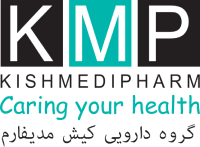
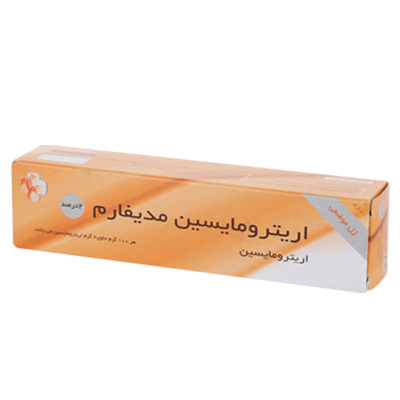
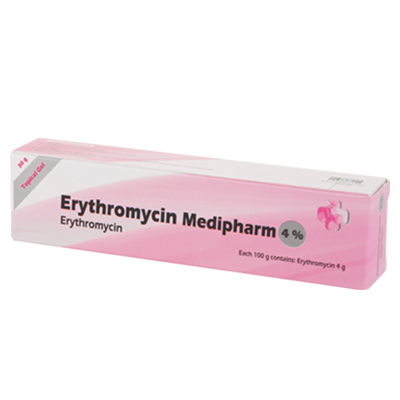
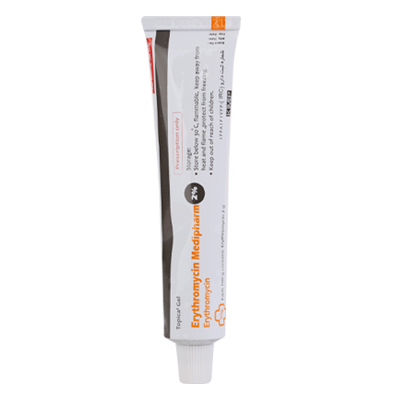
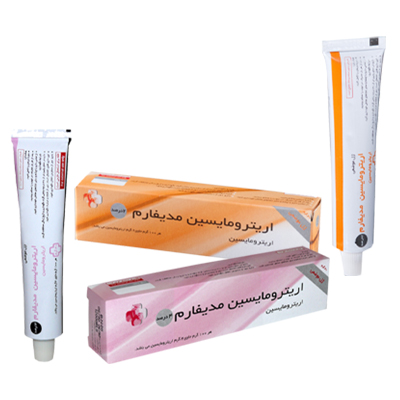
Reviews
There are no reviews yet.